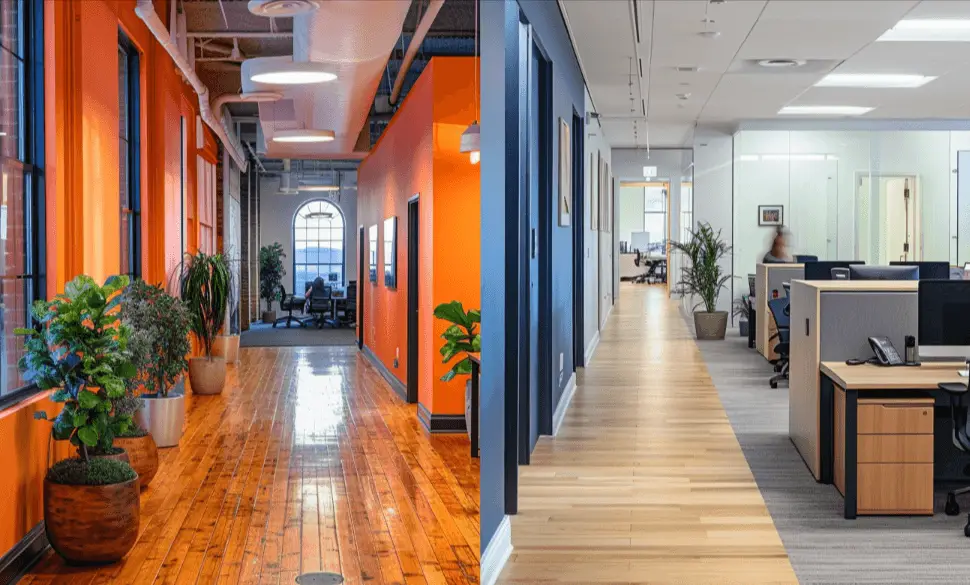As more people embrace remote working, digital nomadism, and work-from-home setups, hot desking and hoteling have gained significant traction. But what exactly are these strategies, and how do they differ? First, let’s define each of them.
What is Hot Desking?
Hot desking is a workspace management system where desks are used by different people at different times on an ad-hoc basis, allowing for office space to be maximized. Hot desking eliminates assigned seating, allowing employees to choose where they sit on a first-come, first-served basis. This method is not only popular in traditional office settings but also forms the backbone of many coworking spaces, catering to the needs of a diverse and mobile workforce. In fact, for many remote workers, coworking is where we’re often introduced to the ‘hot desking’ term to begin with. However, for purposes of this article (and a direct comparison to hoteling, we’ll be focused on the traditional office application).
Key Features:
- No Assigned Seating: Employees don’t have a fixed desk; they choose any available desk upon arrival.
- Flexibility: Offers a dynamic and flexible working environment, ideal for a variety of tasks and collaborations.
- Space Efficiency: Maximizes the use of office space, reducing the number of unoccupied desks at any given time.
- Pros:
- Enhanced Collaboration and Networking: Explain how the dynamic environment of hot desking fosters interactions among employees from different departments or teams, leading to increased opportunities for collaboration and networking.
- Flexibility and Creativity: Discuss how the freedom to choose different workspaces can lead to increased creativity and a break from routine, which can be particularly beneficial for creative roles or tasks.
- Cost-Effective for Businesses: Elaborate on how hot desking can lead to significant cost savings for businesses by optimizing the use of office space and resources.
- Cons:
- Lack of Personal Space: Dive into the challenges employees might face due to the absence of a permanent workspace, such as the inconvenience of moving personal items daily and the lack of a personalized work environment.
- Potential for Disorganization: Address how the lack of a fixed location can lead to issues with organization and time management, and how it might affect productivity for some individuals.
- Not Suitable for All Work Styles: Discuss how hot desking might not be ideal for employees who require a consistent and quiet environment for their work.
I found the impacts of hotdesking to be overwhelmingly positive for both me and my business. From a business standpoint, my web design business has grown as a direct result of being around other companies. It gets you in front of people you otherwise might no be able to contact and you can build a genuine relationship with them just from seeing them at the coffee machine every morning.

Eamonn Mooney
CEO – Kaizen Media
What is Hoteling?
Hoteling, is a structured approach to workspace management. It involves reserving workspaces in advance, much like booking a hotel room. This system is designed for organizations that still want to offer flexibility but with a bit more order and predictability than hot desking.
Key Features:
- Reservation-Based: Employees book their workspace in advance, often using a digital system.
- Structured Flexibility: Provides a balance between flexible working and the assurance of a reserved space.
- Resource Management: Enables better management of office resources and can be integrated with other facilities like meeting rooms.
- Pros:
- Assured Workspace: Highlight the benefit of having a reserved space, which can reduce the anxiety of finding a spot, especially during peak office hours.
- Balance of Flexibility and Structure: Elaborate on how hoteling offers a middle ground between the rigidity of assigned seating and the chaos of hot desking, providing flexibility while maintaining a sense of order.
- Better Resource Management: Discuss how hoteling can lead to more efficient use of office resources, as it allows for better planning and allocation of spaces and equipment.
- Cons:
- Need for Advance Planning: Address the potential drawback of having to plan and reserve a workspace in advance, which might not suit spontaneous work styles or last-minute changes in schedule.
- Less Opportunity for Spontaneous Interaction: Explain how the structured nature of hoteling might reduce chances for impromptu meetings and collaborations that can occur in more fluid environments like hot desking.
- Complexity in Management: Discuss the challenges businesses might face in implementing and managing a hoteling system, including the need for a robust reservation system and potential issues with booking conflicts.
Side by Side Comparison
| Factor | Hot Desking | Hoteling |
|---|---|---|
| Space | First-come basis, dynamic seating | Reserved spaces, planned seating |
| Flexibility | High, with daily choice | Moderate, and only with advanced planning |
| Resource Management | Shared resources, less personalization | Reserved resources, more personalization |
| Privacy | Limited, open environment | Better, with reserved spaces |
| Collaboration | Encouraged by openness | Planned, with reserved spaces |
| Remote Worker Suitability | Great for nomadic style | Great for routine-based work |
Hot desking and hoteling offer unique advantages and challenges. Hot desking caters to those seeking flexibility and spontaneity, fostering a dynamic and collaborative workspace without the need for reservations. Hoteling, on the other hand, provides a structured approach with reserved spaces, appealing to individuals who prefer planning and predictability in their work setting. I would argue that the creative/entrepreneur type of person would benefit from hot desking, while your employee/structured type of person would feel at home in a hoteling scenario.
I want to hear what you choose! Have you experienced hot desking or hoteling where you work? What advantages or challenges have you encountered? Share your thoughts in the comments below.
Jared has worked remotely for 15 years in various marketing capacities, and has managed hundreds of marketing campaigns along the way. He has held freelance, agency, and in-house positions for companies large and small.


